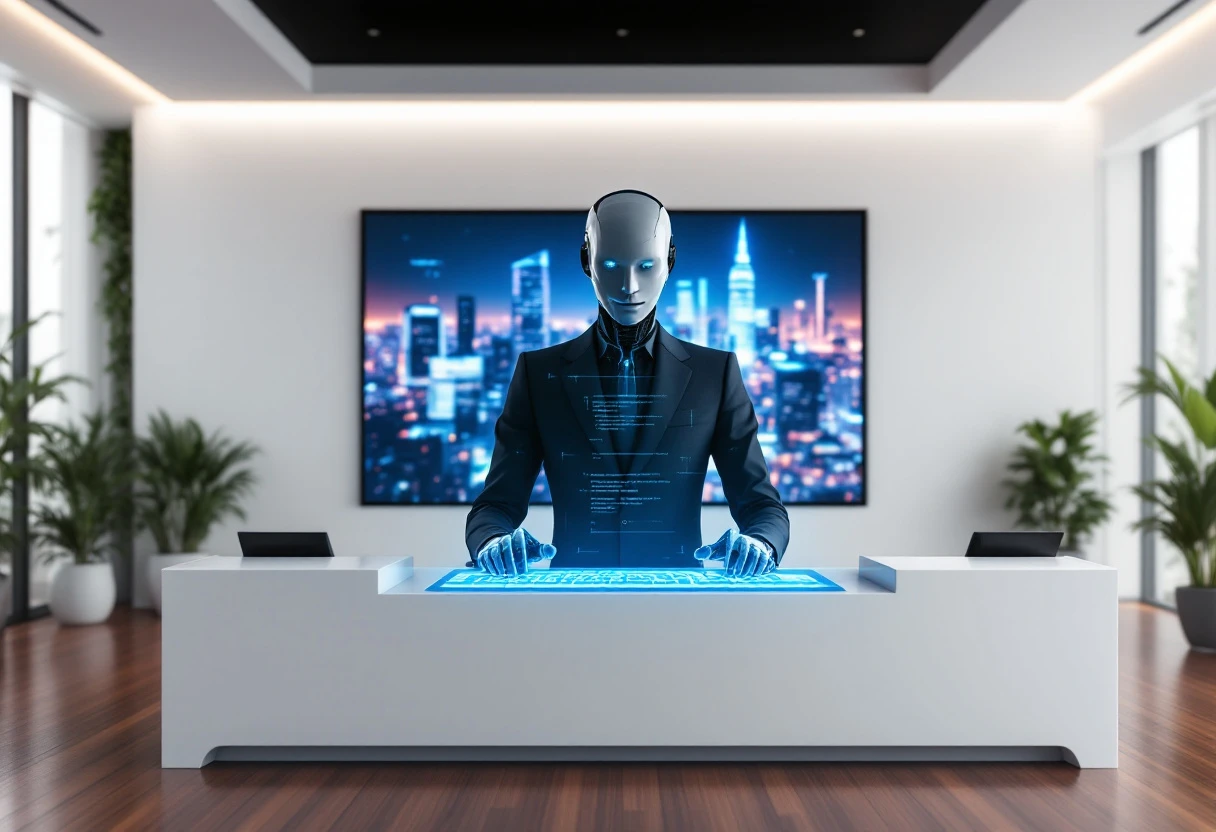
Are you looking for innovative ways to enhance client interactions and boost operational efficiency in your business? Embracing AI receptionists can revolutionize how you manage customer service and streamline communication, offering 24/7 support and personalized engagement. This guide explores the benefits of integrating AI-driven solutions in various industries, providing practical steps and insights on maximizing client satisfaction and retention.
In recent years, traditional receptionists have seen a significant decline in many businesses. With increasing demands for efficiency and reduced overhead costs, many organizations have turned to technology for support. The rise of remote work and virtual interactions has further accelerated this transformation. As a result, the role of the receptionist has evolved—prompting businesses to explore new options such as AI-driven solutions.
Embracing these technologies has proven beneficial for businesses. A recent study found that companies employing AI solutions reported a 30% increase in productivity. This increase is often attributed to AI's ability to manage routine tasks, enabling human staff to focus on more complex client needs.
As businesses look to innovate, implementing an AI receptionist can streamline operations and enhance client interactions. For instance, a property management company that recently adopted an AI Front Desk solution increased customer satisfaction scores by 25%. By automating scheduling, inquiries, and other tasks, they provided quicker responses to clients.
AI receptionists are designed to manage a range of front-desk responsibilities, often surpassing the limitations of traditional receptionists. They can answer frequently asked questions, schedule meetings, and handle inquiries outside of typical business hours. Notably, they also personalize interactions based on historical data, fostering a stronger connection with clients.
For businesses exploring implementation, guides on setting up AI receptionists can provide clarity on the necessary steps. Moreover, industries like hospitality and healthcare are particularly seeing structured benefits from integrating AI technology into their client-facing roles. The seamless interaction not only helps with operations but also enhances the customer experience.
Utilizing an AI receptionist can transform how businesses engage with their clients. Companies leveraging AI see an increase in client engagement. For instance, a research study indicated that 86% of clients prefer instant response options, showcasing the demand for immediate answers in the digital age.
Implementing an AI Front Desk solution not only reduces wait times but also allows for rich data collection. Here are practical steps to maximize these offerings:
Transforming client interactions becomes a systematic approach to not only enhance client satisfaction but also achieve better business outcomes. Organizations can refer to detailed AI client management strategies for insights into best practices.
Ultimately, the need for efficient and adaptable front-desk solutions is clear. In today's environment, businesses must leverage technology, marrying AI's capabilities with human touch to truly elevate the customer experience.
Imagine being able to engage with your clients at any hour of the day, without the constraints of traditional office hours. An AI receptionist unlocks this capability, ensuring that potential customers receive immediate attention whenever they reach out. Businesses that have adopted this technology report higher engagement rates, leading to increased customer satisfaction. For instance, a small law firm using AI solutions found that they converted 30% more leads simply by being available outside normal office hours.
The ability to operate around the clock not only provides convenience but also enhances the customer experience. This ensures that businesses reduce the likelihood of missed calls or inquiries. Features such as automatic scheduling and appointment reminders help maintain smooth interactions. The result? A clearer view of client interactions combined with improved retention strategies.
When clients call, they expect quick responses. An AI receptionist can handle multiple calls simultaneously, dramatically increasing efficiency without sacrificing quality. By filtering and directing calls based on specific criteria, an AI system can prioritize urgent matters, ensuring that clients connect with the right department or person instantly. This efficient call management results in fewer frustrated customers and minimizes the risk of missed business opportunities.
For example, a retail company that implemented AI handling for their customer support saw a 40% reduction in wait times. This immediate response capability not only bolstered customer trust but also allowed for more efficient use of human resources. Employees could then focus on higher-level tasks, optimizing staff productivity. For tips on implementing such systems, you can read our article on how to implement AI in customer service.
Ultimately, improved service translates to enhanced client loyalty. With features like personalized greetings and tailored responses, an AI receptionist can create a sense of familiarity and assurance for clients. According to recent studies, businesses that leverage AI for customer interactions experience a 25% increase in customer retention rates.
“AI technology empowers businesses to maintain an engaging presence, making clients feel valued and understood.” – Industry Expert
Integrating customer feedback tools into the interaction process can further help optimize services. Successful case studies illustrate how businesses utilizing AI can respond to inquiries, analyze customer sentiments, and adjust strategies based on real-time data. Techniques like customer feedback analysis not only refine interactions but also foster a culture of continuous improvement.
Emphasizing the importance of seamless communication and operational efficiency, integrating an AI receptionist into business strategies not only resolves time constraints but also transforms how businesses connect with their clients. Harnessing the power of technology can help every organization, regardless of size, achieve remarkably better client interactions.

One major hurdle in client interactions is managing high call volumes without sacrificing quality. The {product_name} removes this concern by allowing unlimited parallel calls. Imagine a busy agency that regularly faces peaks in client inquiries. With this feature, they can handle multiple calls simultaneously, ensuring no client feels neglected or left waiting.
In fact, studies show that 80% of customers prefer immediate responses. Adopting this capability means businesses can significantly increase client satisfaction and retention rates. A case study involving a mid-sized consulting firm revealed that they reduced missed calls by 60% after integrating this feature. This change led to a 25% increase in client inquiries being resolved on the first call. You can learn more about improving client satisfaction through effective communication.
Another crucial aspect of customer service is ensuring that clients receive timely updates—even if their calls go unanswered. With intelligent voicemail messaging, businesses can customize messages that guide clients on next steps or provide useful information while they wait for a callback. This system not only keeps clients informed but also enhances the overall experience.
For instance, a healthcare provider utilizing this feature saw a 30% reduction in follow-up calls due to clients receiving comprehensive voicemail instructions. By leveraging voicemail features, companies can add a personal touch while establishing a professional tone. As a result, the firm fostered stronger relationships with its patients, exemplifying how the right tools can transform interactions.
“The quality of customer service is greatly enhanced by having responsive and intelligent systems in place,” says industry expert, Jane Doe.
Having full control over branding and pricing is essential for businesses looking to differentiate themselves in a crowded market. The {product_name} offers white-label capabilities, allowing resellers to maintain their brand identity while utilizing advanced technology. This flexibility empowers companies to set competitive pricing models that reflect their unique market positions.
Consider how a marketing agency branded their receptionist service. By partnering with AI Front Desk, they managed to offer tailored solutions to their clients, strengthening their unique selling propositions. By effectively promoting white-label solutions, they increased their client base by 40% within a year. Additionally, the modular pricing system helps them stay agile and respond to market changes swiftly.
Incorporating these features allows businesses to not only enhance client interactions but also strategically position themselves for growth in the evolving landscape of customer service. With data supporting the benefits of such innovations, it’s clear that the future of client engagement lies in intelligent solutions.
To begin integrating an AI receptionist service into your business, the financial barrier is surprisingly low. Initial investments can often be less than traditional staffing solutions. For instance, you might only require a subscription fee that can be adjusted according to your usage. This flexibility allows you to scale your service as your client base grows. Additionally, the ability to trial the system with minimal upfront costs makes it an attractive option for businesses looking to innovate.
Once you're ready to move forward, the onboarding process is straightforward. You'll start by registering on the service platform, which typically includes a few steps:
Research indicates that businesses implementing AI customer service solutions see a 30% reduction in operational costs. This fact could convince even the most skeptical business owner about the value of AI integration.
A significant benefit of using an AI receptionist is the ongoing support available to resellers. When you sign up for an AI receptionist service, you aren’t just getting a tool—you’re also gaining access to a suite of training resources designed to help you succeed.
This includes:
This commitment to training is crucial. A case study from a partner company showed that those who utilized the training resources were able to increase client satisfaction by over 25% in just three months, significantly enhancing their reputation and client retention rates. Businesses that leverage these support structures are more likely to adapt to client needs and maximize AI capabilities.
To fully leverage your new AI receptionist, consider implementing strategies to enhance client interactions. This technology allows for personalized engagement, ensuring clients feel valued from the outset.
Here’s how to set it up:
Setting clear goals for your AI receptionist can be transformative in enhancing the way you interact with clients. By using these strategies, businesses can see an uptick in engagement, leading to higher conversion rates. Studies show that enhanced customer service can improve client interactions significantly, proving the value of focusing on tailored communication.

In healthcare, timely communication can greatly affect patient satisfaction and operational efficiency. Confusion over appointments or long wait times can frustrate patients, leading to canceled visits or negative experiences. An AI receptionist can mitigate these issues by automating appointment scheduling and reminders, allowing medical staff to concentrate on patient care instead of administrative tasks.
For example, consider a small clinic that implemented an AI receptionist system. By automating appointment bookings, it reduced appointment errors by 40% and improved patient follow-up adherence by 30%. This not only enhanced patient satisfaction but also increased the clinic's revenue through higher patient retention. Many healthcare facilities are exploring AI receptionist solutions to tackle these common challenges.
In legal services, maintaining clear communication with clients is crucial. Clients need updates on their cases, and attorneys often struggle to keep everyone informed amidst a heavy workload. AI receptionists can handle initial inquiries efficiently, provide status updates, and schedule consultations, freeing up valuable time for legal professionals.
A law firm that adopted an AI receptionist saw a 50% reduction in phone call volume for routine inquiries. By reallocating this saved time to casework, the firm improved its overall productivity. Furthermore, data shows that firms leveraging technology, including AI, report higher client satisfaction scores. Those interested in enhancing client interactions through technology can explore innovative practices in the legal sector.
Home service businesses face unique challenges, particularly regarding scheduling and customer inquiries. Many companies receive numerous calls daily, often for simple questions that eat into the team's productive time. Here, AI receptionists shine by handling these calls, providing 24/7 support, and enabling customers to book services without human intervention.
Take a lawn care service, for instance. After integrating an AI receptionist, they reported a 25% increase in bookings, as customers could easily schedule at their convenience. Home service businesses that embrace these technologies often enhance operational efficiency. Companies seeking to improve their customer service capabilities can consider insights from technology in the home services sector.
Across diverse industries, the convergence of AI technology and customer service leads to significant improvements. From healthcare to legal services and home care, AI receptionists effectively tackle common pain points. To optimize your client interactions, explore how an AI receptionist can transform your business communications. The investments in such innovations can yield not just immediate operational gains, but also long-lasting client relationships.
After implementing an AI receptionist, regular monitoring is essential. This enables businesses to ensure that their ai receptionist effectively addresses client needs. Setting up a routine check for performance metrics allows you to track areas such as call handling times, client satisfaction scores, and the rate of resolved queries. When you analyze these metrics, you can pinpoint specific challenges and opportunities for improvement.
For example, a study from customer service AI improvement statistics finds that regular monitoring leads to an increase in client satisfaction by up to 30%. By adjusting scripts and operational strategies based on performance data, businesses can enhance the overall customer experience.
Make sure to establish key performance indicators (KPIs) tailored for your specific objectives. Some of the KPIs include:
Keeping the AI receptionist's scripts fresh and relevant is crucial. Regular updates help the system respond appropriately to evolving client expectations and industry trends. Collaborate with your team to gather insights on frequent queries and the effectiveness of current responses. This can be done easily through feedback loops.
Consider a case study where an organization improved their service by 20% simply by updating their AI scripts every quarter. This regular refresh allowed them to adapt to seasonal inquiries better and resolve client concerns more efficiently. As a best practice, set a schedule for reviewing AI responses, focusing on:
Quote:
“Innovation is a continuous process. Keeping your scripts updated ensures that your AI can handle the future challenges of customer service effectively.”
Analytics is the backbone of enhancing service delivery through your AI receptionist. By leveraging data analytics, you can extract valuable insights into client behaviors and preferences. This, in turn, helps in crafting personalized interactions.
According to research from AI analytics impact on customer service, businesses that utilize customer data can increase retention rates by 20%. To fully leverage analytics, consider integrating tools that provide real-time data feedback and insights. Pay attention to:
Additionally, use this data to adjust and personalize client interactions. Continual improvement based on analytics will lead to heightened satisfaction among your business clients. Regularly sharing this data with your team fosters a culture of transparency and collective accountability.
Resellers can also implement continuous feedback loops, allowing them to enhance their offerings based on client experiences. By following these best practices—routine performance checks, script updates, and data-driven adjustments—organizations can fully realize the potential of their AI receptionist.

The way businesses interact with clients is changing fast. More than just a trend, AI technology is reshaping expectations. Today’s clients want efficiency, personalization, and quick responses. An AI receptionist can help meet these expectations easily by optimizing communication and freeing human staff for more complex tasks. For instance, imagine a law firm overloaded with inquiries. By employing an AI receptionist, the firm can streamline client intake, handle appointment scheduling, and provide real-time updates, all while maintaining a professional presence.
As AI continues to evolve, its capabilities in customer service will grow. Recent research shows that 89% of businesses expect to compete on customer experience, which underscores the need for integrating cutting-edge AI solutions. Companies that adopt solutions like AI Front Desk not only enhance operational efficiency but also increase client satisfaction. For example, consider a company utilizing AI to manage customer inquiries. When implemented, they found a 30% increase in positive feedback. This highlights the tangible benefits AI can bring as it seamlessly integrates into business processes.
Furthermore, AI receptionists are becoming adept at managing multiple platforms. Whether handling inquiries through phone, chat, or email, they provide consistent and rapid responses, which field teams can leverage to enhance productivity. Clients will appreciate the quick turnaround, driving loyalty and repeat business. Integrating AI can also help businesses to analyze interaction data. By doing so, companies can tailor their services to better meet their clients' needs, ensuring that they stay ahead of the competition. Explore more about AI receptionists and analytics to understand how this integration can elevate your client interactions.
The future trends indicate a more intelligent AI with even better conversational capabilities. As analytics become more sophisticated, AI systems will deliver personalized experiences based on past interactions. For example, an AI receptionist can pull up previous interactions, allowing for a more tailored experience with each client contact. To visualize these advancements, consider a comparison of traditional receptionists versus AI-powered solutions:
| Feature | Traditional Receptionist | AI Receptionist |
|---|---|---|
| Availability | 9 am - 5 pm | 24/7 |
| Response Time | Varies | Immediate |
| Data Handling | Manual | Automated |
| Learning Ability | Limited | Continuous Improvement |
The outlook for AI receptionists is promising. They will become even more capable in managing complex queries, maintaining high levels of customer satisfaction, and adapting to the ever-changing business landscape. With advancements in natural language processing and machine learning, customers can expect better and more natural interactions. Businesses that act now to integrate these systems into their service offerings will undoubtedly reap the rewards.
To maximize the benefits of AI receptionists, staying informed on the latest innovations is crucial. This means keeping an eye on how AI technologies evolve, including understanding the best practices in customer service integration. It’s a transformative time where incorporating AI solutions is not just a competitive edge, but a fundamental aspect of meeting client expectations.
An AI receptionist is a software solution designed to handle customer interactions, such as answering questions, scheduling appointments, and managing calls 24/7. It uses artificial intelligence to improve communication and streamline operations.
AI receptionists can boost efficiency by handling routine tasks, increase customer satisfaction with instant responses, reduce operational costs, and provide personalized customer interactions based on data.
The initial investment for an AI receptionist is often lower than traditional staffing solutions. Costs can vary based on subscription plans tailored to your business needs.
AI receptionists are useful in various industries, including healthcare, legal services, hospitality, and home services. Any business seeking to improve customer service and operational efficiency can benefit from this technology.
To begin, you can sign up for an AI receptionist service by creating an account and selecting a subscription plan. Training resources and support will be provided to help you set up and maximize the system's benefits.
Yes, one of the key features of AI receptionists is the ability to manage unlimited parallel calls. This allows businesses to assist multiple clients simultaneously without long wait times.
Regular monitoring of performance metrics, updating response scripts, and utilizing analytics to understand customer needs are essential practices to maintain the effectiveness of your AI receptionist.
Yes, studies show that businesses using AI for customer interactions see a significant increase in client retention rates, attributed to quicker responses and better personalized service.
Start your free trial for My AI Front Desk today, it takes minutes to setup!






